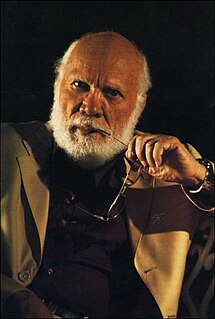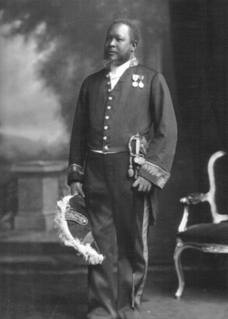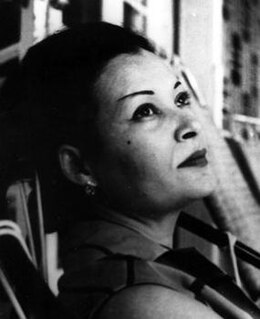Related Research Articles

Frankétienne is a Haitian writer, poet, playwright, painter, musician, activist and intellectual. He is recognized as one of Haiti's leading writers and playwrights of both French and Haitian Creole, and is "known as the father of Haitian letters". As a painter, he is known for his colorful abstract works, often emphasizing the colors blue and red. He was a candidate for the Nobel Prize in Literature in 2009, made a Commander of the Ordre des Arts et Lettres, and was named UNESCO Artist for Peace in 2010.

Jacques Stephen Alexis was a Haitian communist novelist, poet, and activist. He is best known for his novel Compère Général Soleil (1955).
Jules Solime Milscent was a Haitian fabulist, poet, and politician. He was a mulatto, born in Grande-Rivière du Nord to a white French father and a free black mother. Educated in France, Milscent co-founded the periodical L'Abeille Haytienne and served in several government positions, including a seat on the commission to draft the Haitian Civil Code. He is best known for his fables, such as:
Pompée Valentin Vastey, or Pompée Valentin, Baron de Vastey, was a Haitian writer, educator, and politician. Vastey was what people at the time called a "mulatto," because he was born to a white French father and a black Haitian mother. He served as secretary to King Henri Christophe and tutor to Christophe's son, Victor Henri. Vastey also claimed to have fought in Toussaint's army and is said to have been the second cousin of the French novelist and playwright Alexandre Dumas. Vastey is best known for his essays on the history and contemporary circumstances of Haiti.
Guy Joseph Bonnet was a Haitian historian and a major general of the Army of the Republic of Haiti. He was one of the signers of the Haitian Act of Independence, which formally declared Haiti independent from French colonial rule. He is known for his historical book Souvenirs Historiques, published posthumously in 1864.
Liautaud Ethéart (1826–1888) was a Haitian playwright and politician. Born in Port-au-Prince, Ethéart served as Secretary of State in 1879. He was Minister of Finance 1872-1873 and 1876-1877. He is best remembered for his theatrical works.
Joseph Saint-Rémy (1818–1856) was a Haitian historian. He is best known for his biography La Vie de Toussaint Louverture about the Haitian Revolution leader Toussaint L'Ouverture, and for his work Pétion et Haïti, about another Revolutionary figure, Alexandre Pétion. Born in Guadeloupe, Saint-Rémy emigrated to Haiti as a young child and grew up in Les Cayes before leaving for school in France.
Demesvar Delorme was a Haitian theoretician, writer, and politician. Born in Cap-Haïtien, Delorme participated in Sylvain Salnave's failed rebellion against President Fabre Geffrard in 1865. After the fall of Geffrard and Salnave's election as President of Haiti in 1867, Delorme was appointed Minister of External Relations and Minister of Public Education and Cults. In 1868, Delorme was forced to leave the country and fled to Paris, France. He lived there in exile for ten years, publishing several works. One of his best known writings was the essay "Les Théoriciens au Pouvoir", which postulated that political power should belong to the intellectual elite.

Louis-Joseph Janvier was a Haitian journalist, diplomat and novelist.
Solon Ménos was a Haitian author and politician. Born in Anse-à-Veau, Ménos studied in France and received a doctorate in law there at the age of twenty-two. A prominent politician, Ménos served as Haiti's minister to Washington, D.C., and Minister of Finance in 1897. He was a poet and the author of L'Affaire Lüders, which described the conflict between Haiti and Germany during Tirésias Simon Sam's presidency.
Léon Laleau was a Haitian writer, politician, and diplomat. Laleau is still recognized "as one of the most brilliant writers of his time". He received several international awards, such as the Edgar Allan Poe Prize in 1962. He was also a member of the Ronsard Academy, the Académie Méditerranéenne. He was recipient of numerous honors, including The Legion of Honor rank of Grand Officer (France), Saint Grégoire (Vatican), and Palms Académique, Arts et Lettres rank of Commandeur (France).
Justin Lhérisson was a Haitian writer, lawyer, journalist, and teacher. He is best known for two novels, La Famille des Pititecaille (1905) and Zoune Chez sa Ninnaine (1906), and for being the author of the lyrics of Haiti's national anthem, La Dessalinienne.

Frédéric Marcelin (1848–1917) was a Haitian writer and politician. Born in Port-au-Prince, Marcelin was best known for the three novels Marilisse (1903), La Vengeance de Mama (1902), and Thémistocle Epaminondas Labasterre (1901). Along with his contemporaries Fernand Hibbert and Justin Lhérisson he worked to establish a uniquely Haitian novel.

Marie Vieux-Chauvet, was a Haitian novelist, poet and playwright. Born and educated in Port-au-Prince, she is most famous for the novels Fille d'Haïti (1954), La Danse sur le volcan (1957), Fonds des nègres (1960), and Amour, colère et folie (1968). During her lifetime, she published under the name Marie Chauvet.
Jean Fouchard was a Haitian historian, journalist, and diplomat. Fouchard was born in Port-au-Prince and earned a law degree there. He worked as a journalist, founding the periodical La Relèvé, and as a diplomat, serving as the ambassador to Cuba. He is best known for his historical publications.
Rulx Léon was a Haitian physician, historian, and journalist. Doctor Léon was "one of the most respected Haitian scholars." He was the author of a documentary on the history of Haiti entitled Propos d'Histoire d'Haïti (1945/1974).
Alix Mathon was a Haitian novelist, lawyer, politician, and journalist. He received the France-Haïti prize for his novel La Fin des Baïonnettes, which described the events leading up to the United States' occupation of Haiti. Other notable novels by Mathon are Le Drapeau en Berne (1974), Témoignages sur les Evénements de 1957, and La Reléve de Charlemagne.
Henock Trouillot (1923–1988) was a Haitian historian, playwright, and novelist. He wrote historical and sociological books, such as:
Damase Pierre-Louis (1894–1945) was a Haitian historian, statesman, author, journalist and diplomat.
Philippe Hannibal Price was a Haitian diplomat and author.
References
- ↑ "Liste des titulaires du Ministère de l'Economie et des Finances de Janvier 1804 à nos jours". mefhaiti.gouv.ht. Archived from the original on 31 December 2012.
- Schutt-Ainé, Patricia; Staff of Librairie Au Service de la Culture (1994). Haiti: A Basic Reference Book. Miami, Florida: Librairie Au Service de la Culture. p. 106. ISBN 0-9638599-0-0.